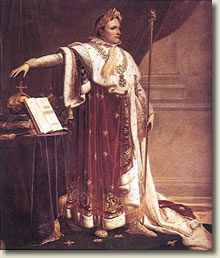A deposed Emperor |

Napoleon Bonaparte contemplates his future on the Bellerophon
 |
| The Emperor Napoleon |
This time, the European powers were not going to take any chances on Napoleon's possible return. They exiled him to the island of St. Helena - a barren, wind-swept rock located in the South Atlantic Ocean.
The Fall of an Emperor
Among the small entourage that accompanied the deposed Emperor into exile was the Comte de Las Cases who kept a diary of his experience:
"August 10
This day we cleared the Channel. We had now entered upon the dreary unknown course to which fate had doomed us. Again my agonies were renewed; again the dear connections I had abandoned resumed their sway over my heart… Meanwhile we advanced in our course and were soon to be out of Europe. Thus, in less than six weeks, had the emperor abdicated his throne and placed himself in the hands of the English, who were now hurrying him to a barren rock in the midst of a vast ocean. This is certainly no ordinary instance of the chances of fortune, and no common trial of firmness of mind.
October 23-24
The Emperor Napoleon, who lately possessed such boundless power and disposed of so many crowns, now occupies a wretched hovel, a few feet square, which is perched upon a rock, unprovided with furniture, and without either shutters or curtains to the windows. This place must serve him for bedchamber, dressing room, dining room, study, and sitting room; and he is obliged to go out when it is necessary to have this one apartment cleaned. His meals, consisting of a few wretched dishes, are brought to him from a distance, as though he were a criminal in a dungeon. He is absolutely in want of the necessaries of life: the bread and wine are not only not such as he has been accustomed to, but are so bad that we loathe to touch them; water, coffee, butter, oil, and other articles are either not to be procured or are scarcely fit for use…
 |
| St. Helena Island |
'I entered their capitals victorious and, had I cherished such sentiments, what would have become of them? They styled me their brother, and I had become so by the choice of the people, the sanction of victory, the character of religion, and the alliances of their policy and their blood. Do they imagine that the good sense of nations is blind to their conduct? And what do they expect from it? At all events, make your complaints, gentlemen; let indignant Europe hear them. Complaints from me would be beneath my dignity and character; I must either command or be silent.'"
References:
The account of the Comte de Las Cases appears in Robinson, James Harvey, Readings in European History (1906); Hamilton-Williams, David, The Fall of Napoleon: the Final Betrayal (1994).
The account of the Comte de Las Cases appears in Robinson, James Harvey, Readings in European History (1906); Hamilton-Williams, David, The Fall of Napoleon: the Final Betrayal (1994).
No comments:
Post a Comment